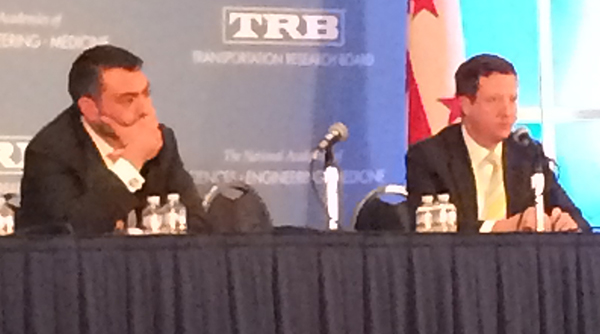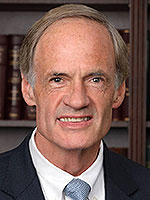Senior Reporter
Discussions on Highway Trust Fund Fix Ongoing, White House Official Says

WASHINGTON — With President Donald Trump declaring infrastructure funding a legislative priority for 2018, the White House and congressional leaders are focused on a long-term fix for the Highway Trust Fund, a White House official said Jan. 8.
“We look forward to working with Congress,” said Alex Herrgott of the White House’s Council on Environmental Quality, at the Transportation Research Board’s annual meeting. “These are conversations that are ongoing.”
The Trump administration, eager to follow December’s tax reform law with a comprehensive infrastructure bill, recognizes the importance behind identifying a way to ensure a sustainable revenue source for the trust fund, and so do transportation policymakers on Capitol Hill, Herrgott explained. Previously, he was a transportation aide for Sen. James Inhofe (R-Okla.), and participated in high-level highway policy negotiations.
Several White House officials have indicated the plan’s legislative priorities would be unveiled prior to Trump’s State of the Union address Jan. 30. A specific date has not been announced.
The Highway Trust Fund backs states with funding assistance through revenue collected from the federal gas and diesel tax. Improvements in fuel consumption and shifting driving habits have contributed to the account’s steady decline, and has prompted several general fund transfers in order to maintain its solvency.
Last month, White House infrastructure policy adviser D.J. Gribbin said the president had not ruled out calling for an increase in federal fuel taxes, a position strongly supported by most infrastructure stakeholders.
Since 1993, federal fuel taxes have been set at 18.4 cents per gallon for gas and 24.4 cents per gallon for diesel. Key Democrats on Capitol Hill support raising federal fuel taxes to restore the trust fund. Republicans, for the most part, oppose the increase.
Herrgott indicated the White House also is aiming to streamline the environmental permitting process to arrive at a two-year period through less duplicative reviews among agencies. That is in line with aspects of the plan unveiled last year, which proposed streamlining the review from 10 years to two years.
According to that same outline of the plan, the White House will call for $200 billion in federal funds as a way to incentivize $800 billion in private capital. Rural projects would receive $25 billion, and the administration would encourage tolling as well as the transfer of public assets to private firms.
Ultimately, the country’s infrastructure funding system would end a strong reliance on the federal system and position primary funding responsibilities to the local agencies charged with day-to-day operations, Herrgott added.
“Our infrastructure package creates a new philosophical approach that changes the way in which we do business,” he said.
James Ray, infrastructure advisor to Transportation Secretary Elaine Chao, joined Herrgott’s panel, and said the White House’s infrastructure proposal would likely include sections for rural priorities, transformative projects, loan programs and cultural changes.
“Changing the process is valuable. Changing the culture around that is equally valuable,” Ray said.
After a meeting between Chao, Trump’s chief economic adviser Gary Cohn, and the Senate Environment and Public Works Committee, ranking member Sen. Tom Carper (D-Del.) said he looked forward to seeing the administration’s “long-promised infrastructure proposal.”

Carper
“As a businessman, I’m sure President Trump can appreciate that business leaders across the country have been telling me for years that, in order to boost America’s global competitiveness and create jobs, we need to make serious investments in our country’s infrastructure to ensure it is more modern and more efficient,” Carper said. “Decades of woefully underinvesting in our nation’s infrastructure has resulted not only in aging roads, highways, bridges, railways and waterways across the country, but also in sacrificed economic growth. I would urge the president to seize this opportunity and follow through with a bold infrastructure plan that resonated with so many Americans on the campaign trail.”

